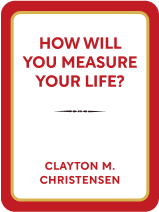

This article is an excerpt from the Shortform book guide to "How Will You Measure Your Life?" by Clayton M. Christensen. Shortform has the world's best summaries and analyses of books you should be reading.
Like this article? Sign up for a free trial here .
Do you want to know more about living with integrity? How can having integrity improve your career and personal relationships?
Living with integrity is all about the small decisions you make every day. Over time, making the wrong decisions can have harmful consequences. Evaluating the way you live your life is important to do before you go too far down the wrong path.
Find out if you’re living with integrity and what that means.
Living With Integrity: Why It’s Important
Most people believe they’re ethical, and they can easily identify right and wrong. But having integrity depends on small everyday decisions made over time, rather than one big decision where there’s a red flag.
Many people start down a slippery slope by engaging in marginal thinking, which is thinking that focuses on the short-term cost or benefit but fails to grasp the full impact of an action. They make small, seemingly harmless decisions or compromises that lead to more and bigger compromises—with devastating consequences, from business failures to jail terms. This is why having integrity is so important.
The key to making ethical decisions is to recognize and avoid marginal thinking in your professional and personal life. This article examines the theory of marginal versus full thinking, how to avoid marginal thinking, and therefore, how to live a life of integrity.
What Is Marginal Thinking?
Marginal thinking means determining whether something is worth doing, given the additional cost or benefit. Both businesses and individuals make this calculation. However, marginal thinking can get people in trouble if they don’t also look beyond the marginal cost, which is short-term, to what a decision might end up costing them down the road.
Marginal thinking applies not only to company bottom lines, but also to choosing right and wrong. The marginal cost of doing something morally questionable “just this once” always seems small, but the full cost turns out to be a lot higher.
It’s easy to convince yourself that it’s OK to do something you wouldn’t normally do because in this instance, there are extenuating circumstances. And the cost seems small because you’re not looking ahead.
Countless numbers of people have ruined their lives and those of others by making this mistake, whether on Wall Street, in politics, or in sports. For example, Nick Leeson, a 26-year-old trader, bankrupted the British merchant bank Barings in 1995. Leeson made a small trading mistake that he didn’t want to admit because he wanted to be seen as a success—so he hid the loss in an obscure trading account. He made more risky trades to pay back the loss, and kept on losing. He lied and forged documents to hide mounting losses. Ultimately, his trading losses soared to $1.3 billion, the bank collapsed, and 1,200 employees lost their jobs. Leeson was sentenced to six-and-a-half years.
Do the Right Thing 100% of the Time
If you cross a moral or ethical line once because of seemingly justifiable circumstances, you’ll keep crossing the line. The best way to avoid this is to never compromise your morals—it’s easier to maintain your standards 100% of the time than 98% of the time. You either stand for something, or you don’t. Once you’ve crossed your moral line, it no longer has any power to stop you—so when faced with the temptation to cross it, stop, think about the long-term cost, then turn around.
Try This Exercise for Living With Integrity
This exercise will help you understand if you’re living with integrity. Many people start down a slippery slope by engaging in marginal thinking that fails to grasp the full impact of their actions. They make small, seemingly harmless decisions or compromises that lead to more and bigger compromises—with devastating consequences. It is hard to know if you’re living with integrity, but these questions might help:
- Describe an instance where you applied marginal thinking at work or at home (that is, you decided to do something morally questionable “just this once”—for example, “fudging” on your expense report or taking a shortcut on a task). Afterward, how did you feel about your decision?
- What were the short-term consequences of this decision? What were the long-term consequences?
- The next time you face a situation where you’re tempted to do something “just this once,” what will you do?

———End of Preview———
Like what you just read? Read the rest of the world's best book summary and analysis of Clayton M. Christensen's "How Will You Measure Your Life?" at Shortform .
Here's what you'll find in our full How Will You Measure Your Life? summary :
- How economic theories that help businesses succeed can also help individuals make better life decisions
- How to build a career that makes you happy
- How to deepen your relationships with your spouse and children






